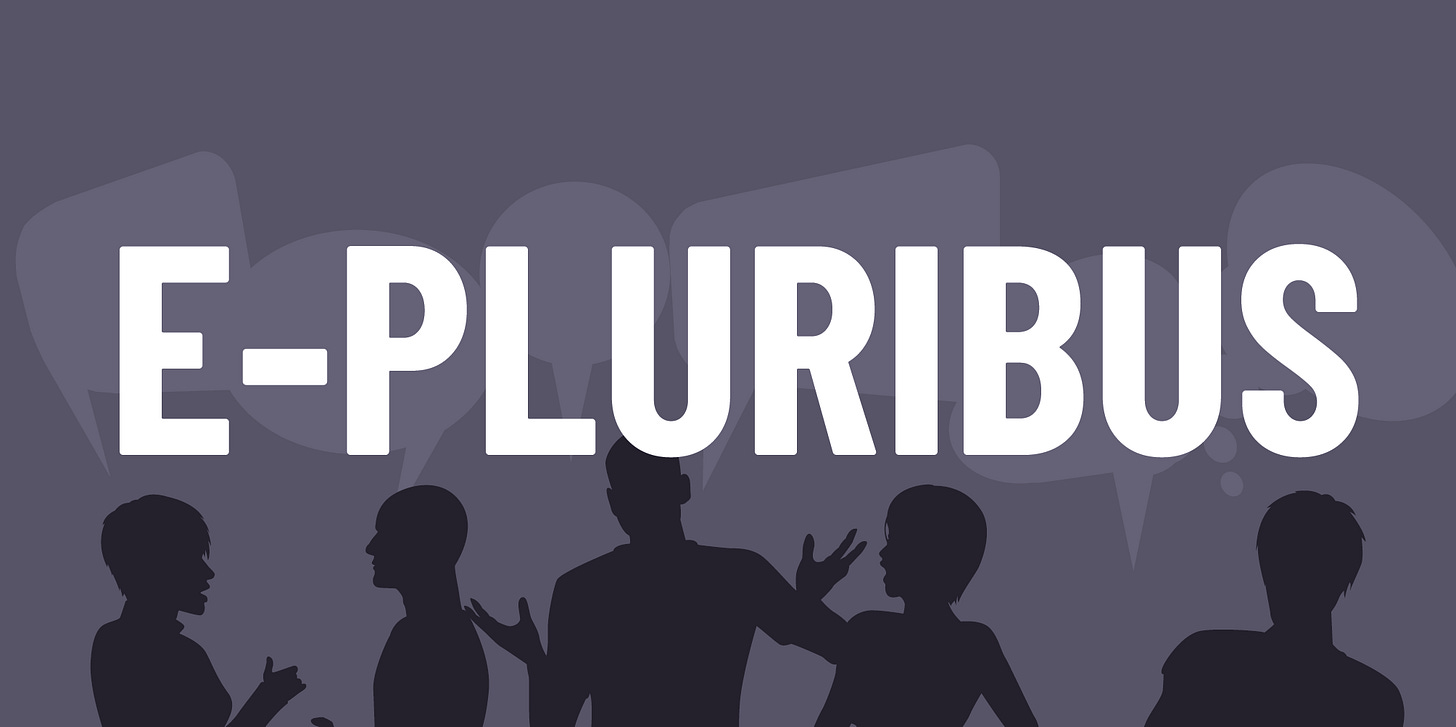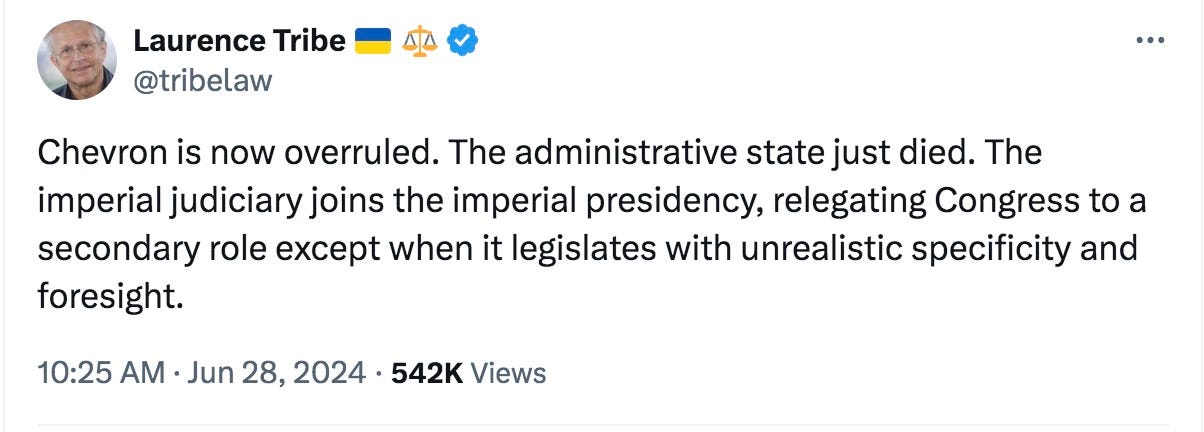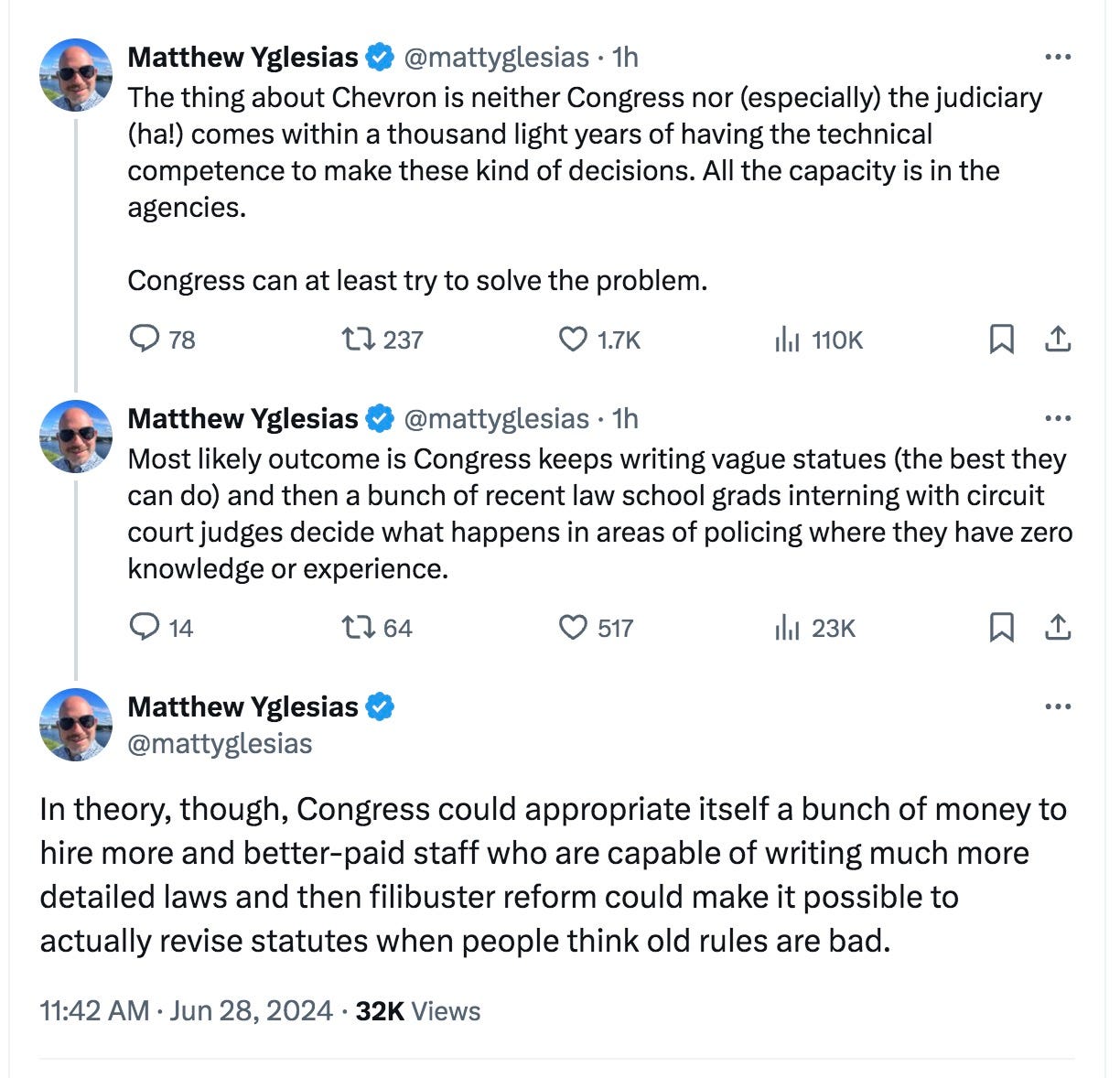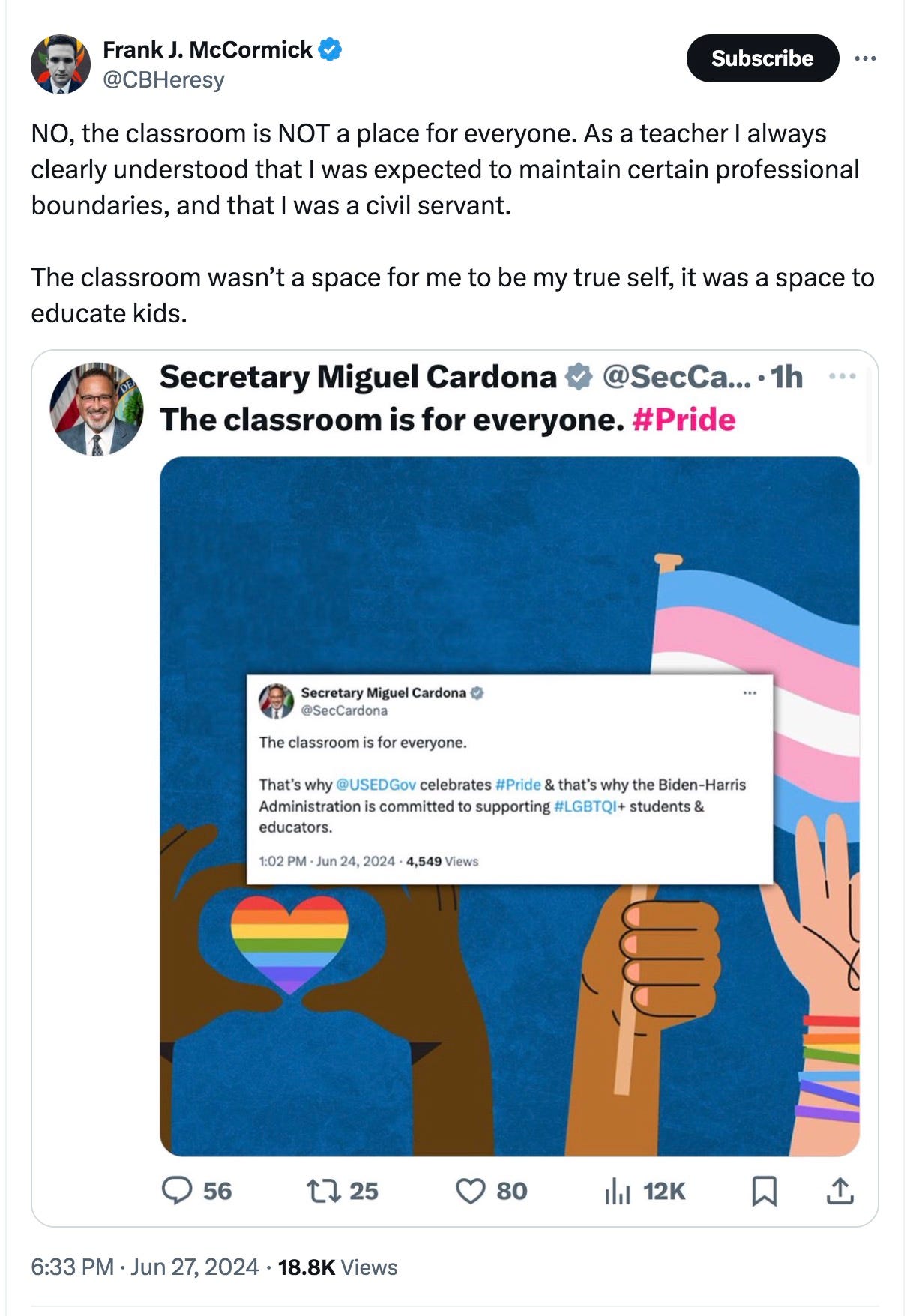E-Pluribus | June 28, 2024
"You're not just wrong, you're...conservative!" Modern medievalism; and whatever happened to the 7th Amendment?
A round-up of the latest and best musings on the rise of illiberalism in the public discourse:
Pamela Paul: Who You Calling Conservative?
Many ideological activists don’t see arguments as between right and left, but rather between right and wrong. In Pamela Paul’s latest for the New York Times, she says too often progressives are eating their own instead of living up to their ostensible open-minded ideals.
You know you’ve touched a nerve with progressive activists when they tell you not just that you’re wrong but that you’re on the other side.
Such is the fate of any old-school liberal or mainstream Democrat who deviates from progressive dogma. Having personally been slapped with every label from “conservative” to “Republican” and even, in one loopy rant, “fascist,” I can attest to how disorienting it is given my actual politics, which are pure blue American only when they aren’t center French.
But it’s not just me. New York magazine’s liberal political columnist Jonathan Chait was accused of lending “legitimacy to a reactionary moral panic” for critiquing political correctness. When Nellie Bowles described the excesses of social justice movements in her book “Morning After the Revolution,” a reviewer labeled it a “conservative memoir.” Meghan Daum, a lifelong Democrat, was accused of having fallen into a “right-wing trap” for questioning the progressive doctrine of intersectional oppression.
If this was just about our feelings, these denunciations could be easily brushed aside. But the goal and the effect is to narrow the focus of acceptable discourse by Democrats and their allies. If liberals are denounced for “punching left” when they express a reasonable difference of opinion, potentially winning ideas are banished.
[. . .]
The goal of progressives may be solidarity, but their means of achieving it are by shutting alternative ideas down rather than modeling tolerance. Leah Hunt-Hendrix, a co-author of a recent book called “Solidarity,” said those liberals who critique illiberalism on the left are “falling into the right’s divide-and-conquer strategy.”
But liberal people can disagree without being called traitors. Liberals can even agree with conservatives on certain issues because those positions aren’t inherently conservative. Shouldn’t the goal be to decrease polarization rather than egg it on? Shouldn’t Democrats aim for a big tent, especially at a time when registered party members are declining and the number of independents is on the rise?
Read the whole thing.
Darran Anderson: A plague of fallacies has devoured the internet
One of the conceits of modernism is that we are much smarter and more sophisticated than our superstitious and gullible forebears. Writing for UnHerd, Darran Anderson argues that maybe we’ve not come so far as we’d like to think.
It is difficult to accept, gazing down from the lofty heights of progress on the sinners and dupes of the past, that we reside in the Golden Age of charlatanism. We like to think we’ve developed a thick skin towards commerce — but objects are the least of our worries. It’s no longer a question of being sold dubious products.
Today’s corporations now deal in intangibles: lifestyles, philosophies, diets, self-image and ambition have all become marketable assets. They are promising us shortcuts to status, vital in an age of precarious hustling, as well as quick fixes to our innumerable economic, political and spiritual deficits. They’re selling the grift — or rather the prospect of escape from it. They’re delivered to us not by the outdatedly gauche media of billboards and television, but directly injected into social media, attuned via algorithms to our tastes and inadequacies.
[. . .]
Every good liar knows the best lies are wrapped around a nugget of truth. If we combined and enacted all the advice of social media, then perhaps physical excellence, sound mental health, enlightenment, happiness, even, might well await. Yet professional liars know the greatest lure is the unattainable and immeasurable. It’s these seductive delusions, cascading on the infinite scroll of social media, that have collapsed the internet. How did this happen?
The answer lies in the constants of the medieval village, which our global village now mimics. Festivities are periodic. Tyrants come and go. The function of the town square is to sell, regardless. Post-Reformation, the market is all. The new faith. There are many fallacies in terms of sales (cost bias, appeal to closure, sales puff, Dunning–Kruger effect etc). These might be seen as positive, at least for the hucksters, but the real profit and damage is to be made in the shadow-side.
[. . .]
How could we be so sophisticated and yet so susceptible? Leon Trotsky wrote of Germany mutating into the Third Reich: “Not only in peasant homes, but also in city skyscrapers, there lives alongside the 20th century the 13th.” I know this quote not directly but from its inclusion in one of the great overlooked prophetic texts of our time — Carl Sagan’s The Demon-Haunted World (1995).
The book is a jeremiad for science and against ignorance. According to Sagan, rigorous enquiry is the best way to begin to understand existence and gain a foothold in our own destiny. Science, he argues, is too important to be left to scientists and that a population which abandons it will be doomed. Though he’s most scathing towards monetised pseudoscience and organised religion (“We can pray over the cholera victim, or we can give her 500 milligrams of tetracycline every 12 hours”), he also warns that science is never absolutely certain or settled, and to suggest so is unscientific. It’s not a series of sacred precepts but rather a constantly developing and self-critical way of seeing the world. Even Isaac Newton, sacrosanct for centuries, was proved inaccurate by Albert Einstein.
When scientists believe, dogmatically or egotistically, they become priests. But science is, or should be, a “built in error-correcting machine” requiring constant maintenance and good faith. The rust that devours and endangers the machine is the same plague that has made the internet feel, paradoxically, smaller than it was; it is the plague of fallacies.
Read it all here.
Billy Binion: Why Are Liberals Suddenly Denouncing the Right to a Jury Trial?
If you scroll through left-leaning Twitter (X) this week, you are likely to see more than one account decrying the death of the “administrative state” based on two Supreme Court rulings. You’d never know from these laments, however, that the rights of individuals (specifically, the right to a jury trial) are being expanded, a classically liberal ideal. So why are liberals so upset, Billy Binion of Reason asks?
The Supreme Court ruled Thursday that people whom the Securities and Exchange Commission (SEC) would like to levy civil penalties against for alleged fraud violations are entitled to a trial by jury. That decision, though consequential in isolation, will likely have effects that extend far beyond that one agency.
[. . .]
The decision came down along ideological lines, with Justice Sonia Sotomayor writing in dissent. It's an interesting schism. Sotomayor has a robust record on questions around related criminal justice issues and the constitutional rights of the accused. She's not alone in that: Justice Ketanji Brown Jackson, for her part, wrote an undergraduate thesis on the coercive nature of plea bargaining, where juries are conspicuously absent, and as an attorney represented clients imprisoned at Guantanamo Bay, where inmates are held without charge or trial.
But here, according to Sotomayor, the jury trial requirement in this civil setting, as outlined in the Seventh Amendment, is "a power grab." She's right, but in the wrong way. It takes power from the federal government—which in some sense holds the monopoly on that—and gives a little of it back to the people. Jarkesy, as Justice Neil Gorsuch acknowledged in a concurring opinion, may very well be unsympathetic. But even potentially unlikeable hedge fund managers should be entitled to the same basic rights.
Those unhappy with today's ruling may be dismayed to learn that the core legal principle will almost certainly not be constrained to the SEC. But they may be surprised, in turn, to know that such defendants are not always the cartoon picture of corporate greed.
[. . .]
"Today's decision is loud and clear: If the government wants to punish people by taking their money, then it must go to a real court with a real judge and a jury," said Bob Belden, an attorney for the Institute for Justice who is representing Sun Valley Orchards in its appeal, in a statement. "The government had argued that cases by the government to impose money fines fall within a 'public rights' exception to the jury right, but the Court rejected that theory. When the government seeks to impose fines, that's exactly the kind of case that requires a jury."
[. . .]
Much of the pushback essentially comes down to the following concern, well-intentioned as it may be: "This will make the government's job harder." To which I say: "Yes." As it should be.
Read it all.
Around Twitter (X)
The Supreme Court has relegated the Chevron doctrine to the ash heap of history. Harvard professor Laurence Tribe is devastated, especially for his law school colleagues and their course material. Matt Yglesias has other ideas.
Secretary of Education Miguel Cardona has some thoughts about the public school classroom and Pride Month. History teacher Frank McCormick begs to differ.
And finally, given President Biden’s performance Thursday night, the Biden campaign is probably regretting this:











